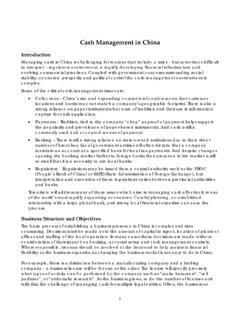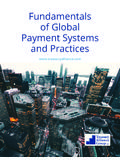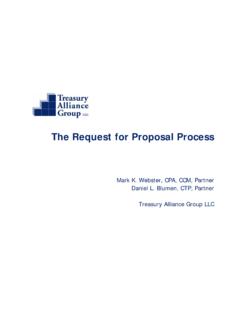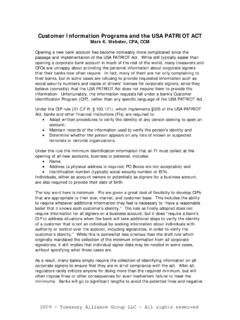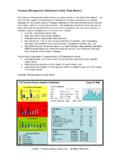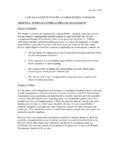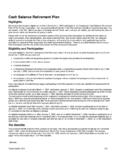Transcription of Notional vs. Physical Cash Pooling Revisited
1 1 International Treasurer / February 2011 n For additional information visit Pooling has enjoyed renewed inter-est over the past few years as the fi nan-cial crisis has raised many fi rms interest in maximizing the availability of internal sources of capital. This very useful cash management strategy, particularly when executed on a global scale, is a proven method of eff ectively making more cash available while simplifying bank account structures and reducing overall bank transaction costs.
2 Any multinational company look-ing to embark on an international cash Pooling project should start with a basic understanding of a typical cash Pooling arrangement and then consider organiza-tional, tax, regulatory and banking issues critical to a successful implementation (a subject for part 2). Pooling is usually accomplished through an arranged bank account struc-ture that mimics corporate accounting treatment and off sets cash defi cits with cash surpluses between diff erent legal en-tities in a corporate group.
3 There are gen-erally two types of Pooling arrangements, Notional Pooling and Physical Pooling . Notional Pooling Notional Pooling refers to the off set of interest income and expense (credit and debit interest), resulting from the vary-ing cash positions in separate bank ac-counts held at the same bank. Each com-pany participating in the pool maintains its own accounts. The bank then creates a shadow or Notional position from all of the participant accounts refl ecting the consolidated cash position on which interest is paid or charged.
4 Notional Pooling is not permitted in all countries, notably the US and Germany, where tax authorities consider it to be a co-mingling of there is no movement of funds involved, the Pooling is referred to as Notional and the legal and tax separa-tion of the pool participants who ulti-mately share a common parent is main-tained. There is no co-mingling of funds although some local tax authorities may interpret this diff erently. Using a single currency example, the results of Notional Pooling are seen in the chart of its simplicity and ease of operation, Notional Pooling is the tech-nique of choice for single currency pools within a particular country where there are varying cash positions; that is, if Notional Pooling is Pooling is not permitted in all countries, notably the US and Germany, where tax authorities consider it to be a co-mingling of funds.
5 Countries where Notional Pooling is most common such as the UK, Nether-lands and Belgium, have minimal or no withholding tax on interest, but there may be country-specifi c interpretations that require a holding company to func-tion as the pool manager such as France, for example. Right of off set (are guarantees needed?) Where allowed, central Bank regulations will dictate how the Pooling bank, as the service provider, accounts for this arrangement on its balance sheet.
6 For example, in many of the countries where Notional Pooling is permitted, the relevant central bank requires that the bank performing the Pooling have cross guarantees between participants in the pool. The logic behind this is that defi cit balances from Pooling participants ap-pear as assets on the bank s balance sheet. Since the bank does not earn interest on these assets because of the Notional off -set with participant surpluses, they could be considered non-performing loans unless the bank has a clear right of off set.
7 The guarantees enable the banks to prove the right of off set, or the right to use surplus funds to cover defi cit positions. However, this cross guarantee require-ment does not apply in the Netherlands, hence the popularity of the Netherlands as a location for Notional Pooling . Notional Pooling takes on more com-plexity when it expands from a single country to multiple-country arrangement. This is due to both the cross-currency and cross-regulatory nature of the pool.
8 Currency conversion. When dealing with more than one currency, it is neces-sary to bring the currencies to a common base currency, usually the Euro or US dollar, before the Pooling and interest off set can take place. This is done in one of two ways:1) Short-dated swaps: one currency is swapped for another at a specifi ed rate. This arrangement can easily be handled internally as the company can execute the swap transaction and thus have better control or at least transparency of both FX and interest rates.
9 However, the internal management of this process becomes somewhat unwieldy from an ad-ministrative perspective if there are more than three or four currencies involved. 2) Notional conversion to a base currency with the risk covered through the adjustment of the interest rates paid or charged in each currency. Either approach from a bank s perspec-tive may make the process more problem-atic and less cost eff ective as the bank s desire to be compensated for its risk takes place at the expense of the corporate Pooling its funds.
10 Usually fees will be as-sessed to cover cost and provide profi t incentive to the bank. In cases where cost or jurisdictional prohibitions limit notion-al Pooling , multinationals turn to Physical Pooling . Physical POOLINGP hysical Pooling is also referred to as zero balancing. It can be achieved on both a single-country and cross-border basis, but only for a single currency at a time. As with Notional Pooling , each com-pany division or subsidiary maintains its own bank accounts, which are normally sub-accounts linked to a main or header Part One of Two Notional vs.

